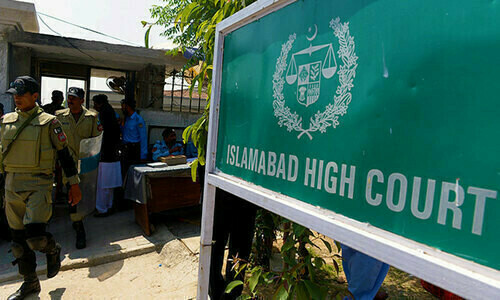ISLAMABAD: The suspension of Comsats Institute of Information Technology (CIIT) Pro-Rector Haroon Rashid – whose doctoral thesis was found to be up to 72pc plagiarised – has stirred debate over the future of the National Testing Service (NTS), of which Mr Rashid was CEO.
Mr Haroon was suspended by the Comsats board of governors, and asked to appear before the board on June 17 to explain his position.
The move came after an Islamabad High Court (IHC) order vacating the stay order granted to Mr Rashid, who had challenged the Higher Education Commission’s (HEC) probe into his allegedly plagiarised doctoral thesis.
Preston University had then cancelled his PhD.
Sources said the board also discussed the future of the NTS, which was initiated by Comsats and headed by Mr Rashid.
They said board members contended that Mr Rashid could not remain NTS CEO. Mr Rashid, who left for the United States a day before the board meeting, was not available for comment.
Despite repeated attempts, Comsats Rector Syed Junaid Zaidi – who is also a member of the governing board – was also unavailable for comment.
However, officials close to Mr Rashid defended his doctoral thesis, arguing that he completed his degree in 2006 while the HEC’s plagiarism policy came into force in 2007.
NTS’ services are usually hired by government organisations in order to recruit employees.
Rise in plagiarism cases
Cases of plagiarism have been increasing at universities, and currently over 40 plagiarism cases regarding universities’ employees have been proven. However, universities have failed to take action against these employees.
Sources say the case of HEC adviser Dr Shaheen Khan has been pending for a couple of years, and the HEC is not acting against her after she received a stay order from a local court.
However, HEC Chairman Dr Mukhtar Ahmed said the HEC has a no-tolerance policy against all those found to be involved in plagiarism.
“We are vigorously following Shaheen Khan’s case, and some other cases which are in the court of law... We also took action against former HEC chairman [Dr Javaid Laghari],” he said.
Dr Ahmed added that as far as taken action against universities’ employees, the HEC has its limitations.
“I do agree in some cases universities didn’t take action against those who have been blacklisted by the HEC. However, as per SOP, we can’t interfere in the affairs of the universities.”
He said that the HEC has now decided that after a certain period of time and repeated reminders, if universities do not act, the commission will.
Published in Dawn, June 13th, 2016










































